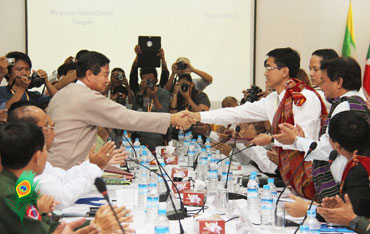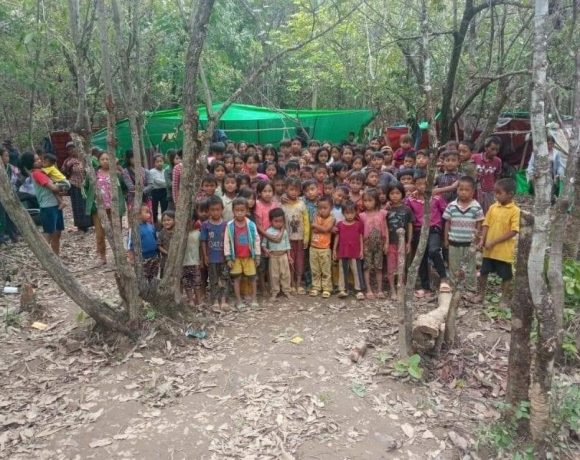To Make Progress on the Peace Process, NLD Must Make Good on the Bilateral Agreements

On December 12th, it will be exactly eight years since the Chin National Front and Myanmar government have reached a bilateral ceasefire agreement that effectively ended 24 years of active armed conflict in Chin State. On April 1st 2021, the National League for Democracy government is expected to be sworn in for its second term in office with a stronger political mandate that comes with sweeping electoral victory from the November 8 general elections.
On the surface, it seems conditions will now improve for the better for the peace and reconciliation agenda now that the NLD government has an even larger commanding share of seats in all of the national and state/regional legislatures. Since winning a landslide victory, the NLD has reached out to dozens of ethnic-based political parties in what many interpreted was an invitation to be part of a ‘national unity’ government. But it remains to be seen whether the invitation was meant as a physical co-optation in the new governing structure or simply a call for ‘cooperative spirit’.
Whichever the case maybe, some ethnic political leaders have now started voicing their opinions on the matter suggesting that such an invitation must not be a mere physical cooptation, but rather something more meaningful. Salai Ceu Bik Thawng, General Secretary of the Chin National League for Democracy (CNLD), for example, have said his party would like to see a more substantive cooperation in the area of policy development where the views of ethnic political parties would be taken into account when the NLD formulate policies that directly affect the non-Bamar ethnic peoples.
One of the key challenges for the new NLD government going forward into the second term will be how to revive the peace process. For the most part, in the last five years the NLD’s performance has fallen short of expectations on most of the key issues on which it campaigned. The peace process is no exception. In fact, it is fair to say that the peace process has largely stalled, not to mention the fact that there has been major backslidings on human rights under the NLD leadership. At the same time, Daw Aung San Suu Kyi’s decision to personally appear before the International Court of Justice (ICJ) in defense of the military has caused a major backlash, which not only tarnished NLD’s image as a government committed to the ideals of justice and human rights, but also greatly damaged Suu Kyi’s own personal reputation among the international community, who have put all their supports behind her without ever seriously questioning the merits of her political maneuverings. For many of these international allies, Suu Kyi’s sudden decision caused an epiphany, which made them to start questioning the NLD’s democratic values and credentials, and re-evaluating their own ties in light of the associated political costs back home with their own public, who demand accountability. More ethnic communities, who were at the receiving end of Burmese military atrocities for decades or are being under attacks, also felt betrayed and insulted by the move, although Daw Aung San Suu Kyi never attempts to hide her fondness of the military.
Because two of the top stated priorities for the NLD concern national reconciliation and peace, it would make sense that the new administration spends time reviving and salvaging the current peace process or what is left of it. But where to begin remains a big question. What is certain, however, is that the effort will prove futile again if the approach remains the same as before. This means that the NLD would need to rethink its strategy, reassess its approach, identify the gaps and recognize where it fell apart. While replacing some of the top people in the negotiation team and putting up new make ups on the National Reconciliation Center (NRPC) might be warranted in order to inject new confidence in the peace process, this should be the easiest of the long list of tasks ahead. But there remains one encouraging fact, which gives optimism to reviving the peace process. And that is the existence of mutual faith in the ideals of the Nationwide Ceasefire Agreement (NCA). Despite all the setbacks, all the parties to the peace process, including the military and the ethnic armed organizations (EAOs) have continued to express faith in the core principles and directions of the NCA.
While the recognition that sticking to the NCA roadmap is the first step, the extent to which such an effort will be successful will largely depend on whether or not some of the core issues that underpin the NCA are effectively addressed first. For it will take serious political will to address the issue. Because the devil is in the details, trying to make it work will involve painstaking efforts and patience. The NCA is made up of a collection of ideals, principles and visions, and foundationally rooted in the bilateral ceasefire agreements. So it is only natural that addressing the peace process through NCA roadmap will necessarily involve revisiting the original bilateral agreements and making concrete plans to implement them in earnest. One of the biggest mistakes of the NLD government during their first term was its preoccupation with bringing in more EAOs to the negotiation table while ignoring the need for implementation of some of the key provisions in the bilateral agreements. This preoccupation with largely symbolic and ceremonial aspect of the peace process in Nay Pyi Taw represented a deviation from focusing on strengthening relationship with EAOs and bridging cooperation between the State government officials and EAO apparatus and Liaison Offices at the ground level. Unlike the previous USDP government whose State governments were deeply involved in the ceasefire negotiations and subsequent tasks of building relationship with the EAOs from the very beginning, the incoming NLD Chief Ministers and officials at the State level, on the other hand, took little interest. In Chin State, for example, the Chief Minister was not only not responsive and uncooperative, but he also took several steps to actively undermine trusts and relationships that was already established with the Chin National Front under the previous USDP government headed by Chief Minister Ex-Brigadier-General Hung Ngai. At least on three separate occasions, the Chief Minister was blamed for deliberately undermining trusts and confidence in the peace process. First, Chief Minister Salai Lian Luai was accused of intentionally not giving a podium to the CNF during the celebration of Chin National Day in Falam, where the CNF leaders were publicly humiliated by seating them on the third row. By contrast, under the previous government headed by Hung Ngai, the national event was jointly organized by the CNF and Chin State Government and they shared a podium during its official commemoration in Mindat and Hakha. Secondly, the Chin State government was accused of using different tactics to attempt to shut down the planned National Dialogue in Thantlang, which was meant to be part of the process for the formal peace agenda. And thirdly, Chin Christian religious leaders who were planning to organize a seminar on social development and peace had had to cancel their event due to delayed permission, which was allegedly deliberately put on hold on the directive of the Chief Minister’s Office. In all of these instances, the National Reconciliation and Peace Center either intervened too late or apparently did not give advanced notice or clear instructions to the State government. In the absence of such clear directives to prioritize peace-related initiatives from the top, the State government was shrugging off its responsibility to facilitate any matters involving the CNF in fulfilment of the bilateral agreement.
Given these experiences from the last term, the second term NLD government will need to focus on creating a coordination mechanism whereby the National Reconciliation and Peace Center and State governments could have a formalized set of protocols, as well as, an official channel of communication. Absent this mechanism will create the same kind of situation in which the State governments would continue to defer any peace related matters to the NRP or NLD leadership in Nay Pyi Taw and vice versa. This will further frustrate strained relations between the EAOs and State governments and undercut further efforts to re-install confidence in the peace process. Having such a system will facilitate better communication between EAOs Liaison Offices and State government officials and will improve conditions for them to cooperate on issues unique to particular geographic areas in pursuit of implementing the bilateral ceasefire agreement.
Overlooking the implementation of the provisions of the bilateral agreements in favor of a largely ceremonial and symbolic efforts of peace building at the national level being one of the biggest weaknesses of the last government’s approach to the peace process, the new NLD government must seek to find ways to prioritize the implementation of the bilateral agreements to be one of their first order of business for the second term administration. As suggested earlier, the central NLD leadership will need to devise a mechanism for coordination and develop formalized protocols for interfacing and communication between the key stakeholders, especially between the NRPC and the State governments. The bilateral agreements, unique for each ethnic group, provides for detailed plans and specific measures to be implemented by the state governments and EAOs, which are designed to facilitate peace building efforts at the national level, as well as instilling public confidence in the peace process at the local level. Most of the points of agreements, therefore, contain important measures designed to produce visible and tangible results in the short term – such outcomes that the public can witness and experience as the immediate benefits of peace. The last five years represented a wasted opportunity. The public definitely deserve better and should be entitled to expect better results in the next five years. In short, the NLD must make good on the bilateral agreements in order to make progress on the peace process in its second term.
By Salai Za Uk Ling
Note: This article will appear on the next issue of print version of the Chin National Journal, a political publication of the Information and Public Relations Department of the Chin National Front.





